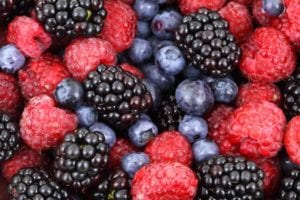Written by Harold Oster, MD. Results suggest that adults who consume berries have a lower risk of inadequate sleep duration.
 Sleep disorders have been linked to various health problems, including obesity, diabetes, stroke, coronary artery disease, and several cancers. Over one-quarter of Americans report poor sleep quality, insufficient sleep, or excessive sleep duration1. Berries contain antioxidants and other nutrients that have been shown to have a beneficial effect on the quality and duration of sleep2,3.
Sleep disorders have been linked to various health problems, including obesity, diabetes, stroke, coronary artery disease, and several cancers. Over one-quarter of Americans report poor sleep quality, insufficient sleep, or excessive sleep duration1. Berries contain antioxidants and other nutrients that have been shown to have a beneficial effect on the quality and duration of sleep2,3.
Li Zhang et al. studied the association between berry consumption and the risk of abnormal sleep duration and sleep difficulty in adults. The authors analyzed data gathered from 2005 through 2018 for the National Health and Nutrition Examination Survey (NHANES), a population-based cross-sectional study conducted by the National Center for Health Statistics at the Centers for Disease Control and Prevention4. Berry consumption was ascertained by two 24-hour dietary recall surveys. Participants who consumed any berries were defined as berry consumers. Sleep duration was determined by a questionnaire and categorized as short (less than seven hours), sufficient (seven to less than nine hours), and long (nine hours or longer). Sleep difficulty was defined as whether the participant had ever told a health professional they had trouble sleeping. Information was gathered for possible covariables, including demographics, medical and psychological disorders, education, physical activity, diet, smoking history, and alcohol use.
The authors noted the following:
- Based on inclusion criteria, data from 29,217 subjects was analyzed.
- Approximately 22% of the participants consumed berries.
- After adjustment for covariables, berry consumers were less likely to report short sleep duration than nonconsumers (odds ratio of 0.9).
- After adjustment for covariables, consumers of strawberries (odds ratio of 0.9) and blueberries (odds ratio of 0.83) were less likely to report short sleep duration than non-consumers.
- No significant associations were found between berry consumption and long sleep duration after adjustment for covariables.
- After adjustment, consumers of blackberries were less likely to report sleep difficulty than nonconsumers (odds ratio of 0.63).
Results suggest that berry consumption is associated with a reduced risk of short sleep duration, and blackberry consumption is associated with a reduced risk of sleep difficulty. Limitations include the use of 24-hour dietary recall surveys to define berry consumption, self-reporting to determine sleep duration and sleep difficulty, and possible residual confounding.
Source: Zhang, Li, Joshua E. Muscat, Penny M. Kris-Etherton, Vernon M. Chinchilli, Julio Fernandez-Mendoza, Laila Al-Shaar, and John P. Richie. “Berry Consumption and Sleep in the Adult US General Population: Results from the National Health and Nutrition Examination Survey 2005–2018.” Nutrients 15, no. 24 (2023): 5115.
© 2023 by the authors. Licensee MDPI, Basel, Switzerland. This article is an open access article distributed under the terms and conditions of the Creative Commons Attribution (CC BY) license (https://
creativecommons.org/licenses/by/4.0/).
Click here to read the full text study.
Posted January 17, 2024.
Harold Oster, MD graduated from medical school in Miami, Florida in 1992 and moved to Minnesota in 2004. After more than 25 years of practicing Internal Medicine, he recently retired. Dr. Oster is especially interested in nutrition, weight management, and disease prevention. Visit his website at haroldoster.com.
References:
- Czeisler CA. Duration, timing and quality of sleep are each vital for health, performance and safety. Sleep Health. Mar 2015;1(1):5-8. doi:10.1016/j.sleh.2014.12.008
- Pengpid S, Peltzer K. Fruit and Vegetable Consumption is Protective from Short Sleep and Poor Sleep Quality Among University Students from 28 Countries. Nature and science of sleep. 2020;12:627-633. doi:10.2147/nss.S263922
- Pereira GA, da Silva A, Hermsdorff HHM, Moreira APB, de Aguiar AS. Association of dietary total antioxidant capacity with depression, anxiety, and sleep disorders: A systematic review of observational studies. J Clin Transl Res. Oct 26 2021;7(5):631-640.
- Dwyer J, Picciano MF, Raiten DJ. Collection of food and dietary supplement intake data: What We Eat in America-NHANES. J Nutr. Feb 2003;133(2):590s-600s. doi:10.1093/jn/133.2.590S
